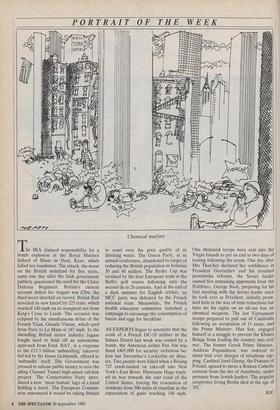PORTRAIT OF THE WEEK
Chemical warfare The IRA claimed responsibility for a bomb explosion at the Royal Marines School of Music in Deal, Kent, which killed ten bandsmen. The attack, the worst on the British mainland for five years, came one day after the Irish government publicly questioned the need for the Ulster Defence Regiment. Britain's current account deficit for August was £2bn, the third worst shortfall on record. British Rail unveiled its new InterCity 225 train, which reached 140 mph on its inaugural run from King's Cross to Leeds. The occasion was eclipsed by the simultaneous debut of the French Train, Grande Vitesse, which sped from Paris to Le Mans at 187 mph. In the dwindling British motor industry Jaguar fought hard to fend off an unwelcome approach from Ford. BAT, in a response to the £13.5 billion 'unbundling' takeover bid led by Sir James Goldsmith, offered to `unbundle' itself. The Government was pressed to release public money to save the ailing Channel Tunnel high-speed rail-link project. The Conservative Party intro- duced a new, 'more human' logo of a hand holding a torch. The European Commis- sion announced it would be taking Britain to court over the poor quality of its drinking water. The Green Party, at its annual conference, abandoned its target of reducing the British population to between 30 and 40 million. The Ryder Cup was retained by the host European team at the Belfry golf course following only the second tie in 28 contests. And at the end of a dark summer for English cricket, an MCC party was defeated by the French national team. Meanwhile, the French health education committee launched a campaign to encourage the consumption of bacon and eggs for breakfast.
AS EXPERTS began to speculate that the crash of a French DC-10 airliner in the Sahara Desert last week was caused by a bomb, the American airline Pan Am was fined £405,000 for security violations be- fore last December's Lockerbie air disas- ter. Two people were killed when a Boeing 737 crash-landed on take-off into New York's East River. Hurricane Hugo track- ed its way towards the east coast of the United States, forcing the evacuation of residents from 500 miles of coastline in the expectation of gusts reaching 140 mph. One thousand troops were sent into the Virgin Islands to put an end to two days of looting following the storm. One day after Mrs Thatcher declared her confidence in President Gorbachev and his troubled perestroika reforms, the Soviet leader ousted five remaining opponents from the Politburo. George Bush, preparing for his first meeting with the Soviet leader since he took over as President, initially prom- ised little in the way of arms reductions but later set his sights on an all-out ban on chemical weapons. The last Vietnamese troops prepared to pull out of Cambodia following an occupation of 11 years, and the Prime Minister, Hun Sen, engaged himself in a struggle to prevent the Khmer Rouge from leading the country into civil war. The former Greek Prime Minister, Andreas Papandreou, was ordered to stand trial over charges of telephone tap- ping. Cardinal Josef Glemp, the Primate of Poland, agreed to move a Roman Catholic convent from the site of Auschwitz, under pressure from Jewish leaders. The popular songwriter Irving Berlin died at the age of 101.
RJC


























































 Previous page
Previous page